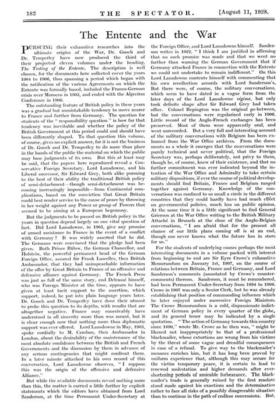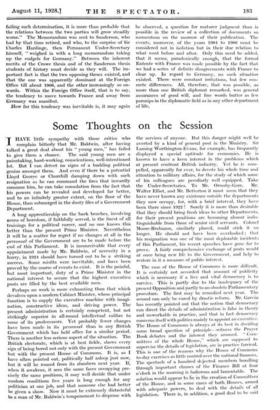The Entente and the War
PURSUING their exhaustive researches into the ultimate origins of the War, Dr. Gooch and Dr. Temperley have now produced the third of their projected eleven volumes under the heading, The Testing of the Entente. The description is well chosen, for the documents here collected cover the years 1904 to 1906, thus spanning a period which began with the ratification of the various Agreements on which the Entente was formally based, included the Franco-German crisis over Morocco in 1905, and ended with the Algeciras Conference in 1906.
The outstanding feature of British policy in these years was a gradual but unmistakable tendency to move nearer to France and further from Germany. The question for students of the " responsibility question " is how far that tendency was inevitable and whether the policy of the British Government at this period could and should have been differently shaped. To that question this volume, of course, gives no explicit answer, for it is not the business of Dr. Gooch and Dr. Temperley to do more than place in the hands of the public the material on which the public may base judgments of its own. But this at least may be said, that the papers here reproduced reveal a Con- servative Foreign Secretary, Lord Lansdowne, and his Liberal successor, Sir Edward Grey, both alike pursuing to the best of their ability the traditional British policy of semi-detachment—though semi-detachment was be- coming increasingly impossible—from Continental com- plications, based on the conviction that Great Britain could best render service to the cause of peace by throwing in her weight against any Power or group of Powers that seemed to be aiming at a European hegemony.
But the judgments to be passed on British policy in the years in question depend largely on one vital question of fact. Did Lord Lansdowne, in 1905, give any promise of armed assistance to France in the event of a conflict with Germany ? It was widely asserted that he did. The Germans were convinced that the pledge had been given. Both Prince Biilow, the German Chancellor, and Holstein, the powerful permanent head of the German Foreign Office, assured Sir Frank Lascelles, then British Ambassador, that they had unimpeachable information of the offer by Great Britain to France of an offensive and defensive alliance against Germany. The French Press was just as full of the same story, and Delcasse himself, who was Foreign Minister at the time, appears to have given at least tacit support to the assertion, which support, indeed, he put into plain language years later. Dr. Gooch and Dr. Temperley have done their utmost to probe this question to its depths, with results that are altogether negative. France may conceivably have understood in all sincerity more than was meant, but it is clear enough now that nothing more than diplomatic support was ever offered. Lord Lansdowne in May, 1905, spoke cordially to M. Cambon, then Ambassador in London, about the desirability of the maintenance of the most absolute confidence between the British and French Governments and the discussion by them in advance of any serious contingencies that might confront them. In a later minute attached to his own record of this conversation, Lord Lansdowne observes, " I suppose this was the origin of the offensive and defensive Alliance."
But while the available documents reveal nothing more than this, the matter is carried a little further by explicit statements which the editors have obtained from Lord Sanderson, at the time Permanent Under-Secretary at the Foreign Office, and Lord Lansdowne himself. Sander- son writes in 1922, " I think I am justified in affirming that no such promise was made and that we went no farther than warning the German Government that if Germany attacked France in connection with the Entente we could not undertake to remain indifferent." On this Lord Lansdowne contents himself with commenting that his own recollection accords with Lord Sanderson's. But there were, of course, the military conversations, which seem to have dated in a vague form from the later days of the Lord Lansdowne regime, but only took definite shape after Sir Edward Grey had taken office. Colonel Repington was the original go-between, but the conversations were regularized early in 1906. Little record of the Anglo-French exchanges has been preserved. Most of them were apparently oral, and went unrecorded. But a very full and interesting account of the military conversations with Belgium has been ex- humed from the War Office archives. From the docu- ments as a whole it emerges that the conversations were purely technical and never political, that the Foreign Secretary was, perhaps deliberately, not privy to them, though he, of course, knew of their existence, and that no further commitment was ever indicated beyond the in- tention of the War Office and Admiralty to take certain military dispositions, if ever the course of political develop- ments should find Britain, France and Belgium ranged together against Germany. Knowledge of the con- versations was confined to so small a circle in the different countries that they could hardly have had much effect on governmental policies, much less on public opinion. At the same time it is a little significant to find General Grierson at the War Office writing to the British Military Attache in Brussels at the close of the Anglo-Belgian conversations, " I am afraid that for the present all chance of our little plans coming off is at an end, though one never knows what the future has in store for us."
For the students of underlying causes perhaps the most interesting documents in a volume packed with interest from beginning to end are Sir Eyre Crowe's exhaustive Memorandum on January 1st, 1907, on the course of relations between Britain, France and Germany, and Lord Sanderson's comments (annotated by Crowe's counter- comments) thereon. Sanderson, it must be remembered, had been Permanent Under-Secretary from 1894 to 1906. Crowe in 1907 was only a Senior Clerk, but he was already establishing that position of commanding influence which he later enjoyed under successive Foreign Ministers. The Crowe Memorandum is a cold, dispassionate indict- ment of German policy in every quarter of the globe, and its general tenor may be indicated by a single quotation. " The action of Germany towards this country since 1890," wrote Mr. Crowe as he then was, " might be likened not inappropriately to that of a professional blackmailer, whose extortions are wrung from his victims by the threat of some vague and dreadful consequences in case of a refusal. To give way to the blackmailer's menaces enriches him, but it has long been proved by uniform experience that, although this may secure for the victim temporary peace, it is certain to lead to renewed molestation and higher demands after ever- shortening periods of amicable forbearance. The black- mailer's trade is generally ruined by the first resolute stand made against his exactions and the determination rather to face all risks of a possibly disagreeable situation than to continue in the path of endless concessions: But, failing such determination, it is more than probable that the relations between the two parties will grow steadily worse." The Memorandum was sent to Sanderson, who had by that time retired, and who, to the surprise of Sir Charles Hardinge, then Permanent Under-Secretary himself, " weighed in with a long memorandum taking up the cudgels for Germany." Between the inherent merits of the Crowe thesis and of the Sanderson thesis students of history must decide as they will. The im- portant fact is that the two opposing theses existed, and that the one was apparently dominant at the Foreign Office till about 1906, and the other increasingly so on- wards. Within the Foreign Office itself, that is to say, the tendency to move towards France and away from Germany was manifest.
How far this tendency was inevitable is, it may again be observed, a question for maturer judgment than is possible in the review of a collection of documents so momentous on the morrow of their publication. The events, moreover, of the years 1904 to 1906 must be considered not in isolation but in their due relation to what went before and after. Only this need be added, that it seems, paradoxically enough, that the formal Entente with France was made possible by the fact that we had a series of definite disagreements with France to clear up. In regard to Germany, no such situation existed. There were constant irritations, but few con- crete differences. All, therefore, that was possible, as more than one British diplomat remarked, was general assurances of good will, and fine words butter as few parsnips in the diplomatic field as in any other department of life.





























 Previous page
Previous page